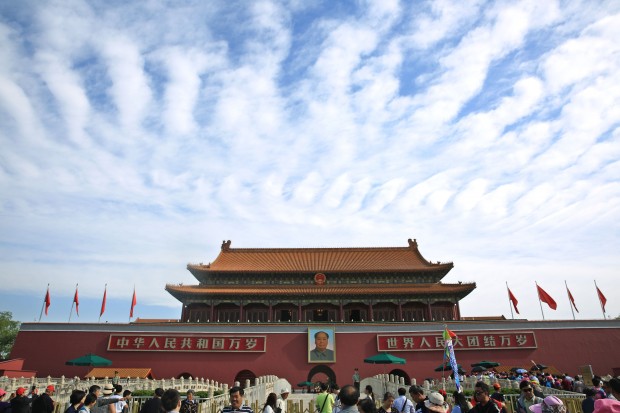China’s tale of pride, prejudice

BEIJING, May 24, 2016 (Xinhua) — Photo taken on May 24, 2016 shows the Tian’anmen Rostrum in Beijing, capital of China. Beijing greeted sunny weather on Tuesday. (Xinhua/Cai Yang) (zwx)
By Tom Plate – The Korea Times
The café in Los Angeles was well shaded from the glaring outside sun and not even half full and no one was within overhearing distance. My appointment was with a diplomat ― a smart Ministry of Foreign Affairs veteran from the People’s Republic of China. I needed to talk to him ― no, wrong: I needed him to talk. The background is that this is the thing I do when I am not teaching at my university or working out chapters of the next book. I try to listen carefully to people who know more than I do (a notably vast pool).
The PRC diplomat arrived sans suit jacket, in a gray sports shirt and slacks, and stirred the hot latte put before him without enthusiasm. His spirit was low. The UN Tribunal in the Netherlands had ruled against his government on the Philippines brief in the South China Sea case. And his job was public diplomacy. For him and other Chinese “public” diplomats, it was not exactly the night before Christmas.
China is a riddled entity of profound vastness ― one big Jupiter surrounded by many twirling Asian moons. Despite all the post-Mao openness, all the enforced globalized intimacy and all those Western think tanks, it has proven about as easy to unravel as string theory. I read academic journal articles and trudge through long books by China “experts,” but sometimes wonder if the notion of a “China expert” is often more hope than realization.
“There is an occupational hazard for anyone who chooses to write about Chinese politics in the second decade of the twenty-first century,” admits Prof. Kerry Brown of King’s College, London, in his dazzlingly detailed new book “CEO, CHINA: The Rise of Xi Jinping. “We may live in an age of openness and information, but the inner workings of the Chinese political system … remain one of the few bastions of opacity.” More presumptive “experts” should follow Brown’s lead and humbly offer their “expertise” with modesty. Few do.
With Beijing, Western arrogance grates. Representing a government atop a continuous civilization that dates back thousands of years, my friend the diplomat parried my questions by seeking to elicit, sincerely, my thoughts on the UN Tribunal’s anti-China decision on the South China Sea. This struck me as a trap, though un-plotted: Anything this American might say short of saying that the Hague Tribunal was a CIA front might be viewed by him as anti-China.
In all fairness, Manila’s decision to file its arbitration case, egged on by Washington, was never going to do much but add to the tension. Mr Xi Xinping’s neighborhood is no happier a place thanks to The Hague.
“Our public diplomacy must be improved,” said the PRC diplomat when he started to open up. In his view, Beijing’s problem is that it is misunderstood by the world. Perhaps ― but sometimes it is either understood all too well or deliberately misunderstood. In the South China Sea, China has consistently put forth core sovereignty as the basis of its claims. What part of that stand did Manila in pressing its legalistic case in The Hague not get? Modern China draws the red line on sovereignty – including sovereignties, in China’s mind, regained with its rise. No court in Europe could ever shake that sense of rectitude. Even this polished professional PRC diplomat cannot hide the deep well of emotion that comes from the sense that now is China’s time – the era of catching-up on old losses and evening-up causes once thought lost. “We’re not afraid of Europe,” is the diplomat’s way of dismissing some full-of-itself UN tribunal in a far-off Dutch coastal city in the Netherlands.
The sincerity (if not the wisdom) of that emotion is impossible to doubt but the time had come for a bit of bluntness. Trying to appear as casual as the young waiter seemingly avoiding our table, I asked why his government hadn’t anticipated the inevitable “public-diplomacy” problem from the Hague decision by working harder to defuse Manila’s volatility. Why not have thrown a real concession or two its way?
The diplomat hesitated; I had hit a nerve, and took a stab at an answer myself: “Nationalism, right?”
He looked at me directly but responded with the slightest nod that I took to be yes.
I couldn’t help myself: “But nationalism’s also a force in the Philippines. They’re people too, right? And Vietnam doesn’t have nationalism?”
He said nothing but his eyes said a lot. China’s problem is less with neighboring nations than its own people. Its foreign relations are fueled more by domestic pressures than by logical interactions with neighbors.
A long time ago, a wise American offered this enduring perspective: “Today China stands isolated, mistrustful and hostile toward the outside world; her whole history has contributed to the view of herself as a superior civilization set upon by hostile barbarians…. China’s ancient pride may be an obstacle to communication, but it also provides the opportunity to breach the barrier of mistrust and hostility by treating China with the respect that is her due as a great and ancient civilization.” This foreign-relations homily came from U.S. Senator J. William Fulbright (1905-1995), the famous chairman of the Senate Foreign Relations Committee, in his classic book with the enduring title: ‘The Arrogance of Power.’ This was written in the mid-1960s.
Now, it’s a half-century later: Can the West honestly say that it finally gets it? But at the same time: When will China be able to tell us that it’s finally over it?

























































